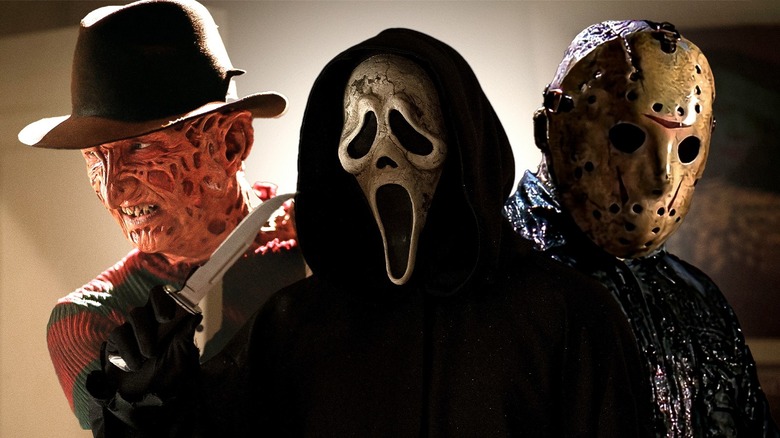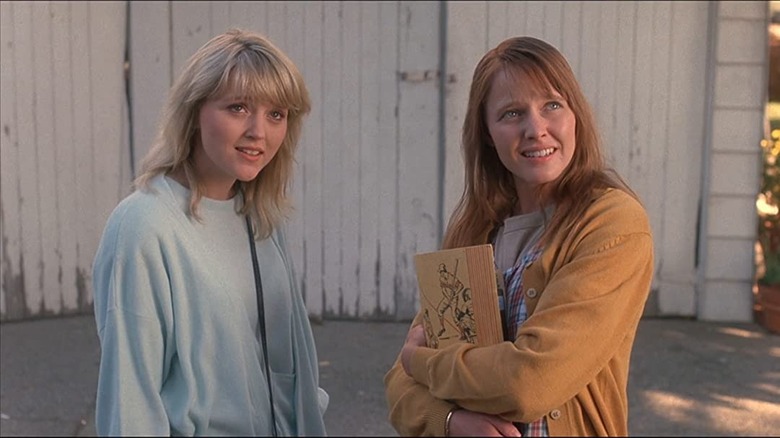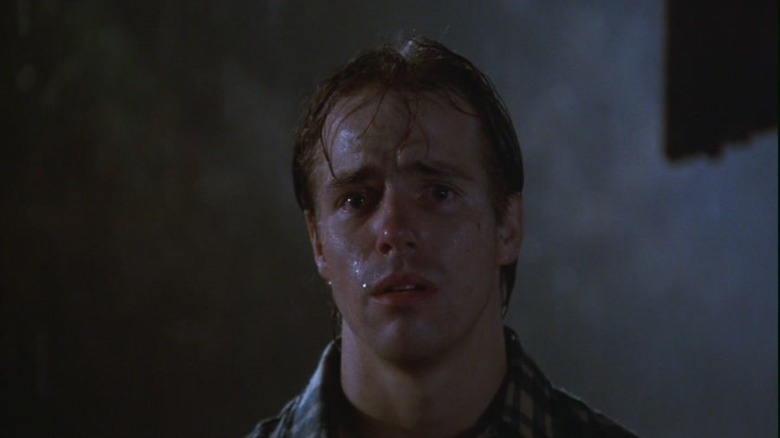Scream VI Sees The Franchise Entering Its Middle Chapter, Just Like Nightmare On Elm Street And Friday The 13th
Right from its inception, the "Scream" franchise was never intended to be merely a great horror movie. Original writer Kevin Williamson always wanted the film to have loftier goals; as he said in a 2021 interview, "'Scream' was a new way of doing a horror film, a deconstruction." Original director Wes Craven almost didn't direct the first "Scream," having already made another meta-deconstruction of the horror genre, 1994's "Wes Craven's New Nightmare," but was convinced to sign on eventually.
In Williamson and Craven's hands, the first four "Scream" films doubled as of-the-moment commentaries on the state of the slasher film and Hollywood trends in general. The first "Scream" established the general "rules" of a slasher, "Scream 2" opined on the increased budgets and mayhem of a sequel, "Scream 3" mused on what makes a good trilogy, and "Scream 4" tackled the then-rampant trend of the "reboot." 2022's "Scream," directed by franchise newcomers Matt Bettinelli-Olpin and Tyler Gillett (collectively known as Radio Silence) and written by James Vanderbilt and Guy Busick, continued the series tradition by making a meta-commentary on "legacy sequels" that have been all the rage for the past decade.
Yet the same team's "Scream VI," in theaters now, follows so quickly on the heels of its predecessor that current trends in horror and Hollywood haven't changed all that much. While the film makes a case for the installment representing a "franchise" instead of a "requel," the examples it uses — the Marvel Cinematic Universe, et al — aren't the most applicable. The label is nonetheless correct, however, as "Scream VI" does indeed resemble the middle chapter of a franchise. A slasher franchise, to be precise, as the film emulates the middle chapters of both the "A Nightmare on Elm Street" and "Friday the 13th" series.
A new generation of 'Scream' warriors
2011's "Scream 4" seemed to indicate that a new core set of characters would be taking over the franchise from the original surviving trio of Sidney Prescott (Neve Campbell), Gale Weathers (Courteney Cox), and Dewey Riley (David Arquette), but of course, that all turned out to be a ruse, as all of them were murdered and two of them turned out to be the Ghostfaces responsible.
That left 2022's new younger core characters — Sam Carpenter (Melissa Barrera), Tara Carpenter (Jenna Ortega), Mindy Meeks-Martin (Jasmin Savoy Brown), and Chad Meeks-Martin (Mason Gooding) — to properly take the torch passed to them by Sidney, Gale and Dewey, legacy sequel-style. "Scream VI" sees the film and, by extension, the series continuing forward with primarily those "Core Four," as only Gale and a not-dead Kirby Reed (Hayden Panettiere) from "Scream 4" return to the series.
This passing of the torch to a new ensemble has happened before in the slasher world, however, specifically in "A Nightmare on Elm Street." In part 3, "Dream Warriors," the heroine of the first "Nightmare," Nancy Thompson (Heather Langenkamp), returns, shepherding a group of troubled Elm Street teens as they fight Freddy Krueger (Robert Englund) in their dreams. The survivors of that film appear in part 4, "The Dream Master," where they're quickly killed off, passing the torch (and their dreamland superpowers) onto the new Final Girl, Alice Johnson (Lisa Wilcox).
In the "Elm Street" series "dream trilogy" of 3, 4, and 5 ("The Dream Child"), this soft reset occurs in each film, with a new ensemble of heroes (or victims, as the case may be) featuring alongside at least one recurring character. The New York City setting of "Scream VI," along with a de-emphasis on the legacy characters (though not the legacy of the series itself) gives the installment a very "dream trilogy" vibe.
Tommy Jarvis, Sam Carpenter, and the temptation of evil
The "Friday the 13th" series also featured its very own middle trilogy of recurring themes and characters. Beginning with the fourth film (hilariously, erroneously entitled "The Final Chapter"), the series introduced the character of Tommy Jarvis, initially played by Corey Feldman. A mostly well-adjusted kid, Tommy's family is unluckily staying in their cabin near Crystal Lake when Jason Voorhees escapes from the morgue. After slaying a group of partying teens nearby, Jason comes for the Jarvises. Tommy, a horror fan and makeup prodigy, turns himself into the visage of young Jason, distracting the killer long enough to dispatch him.
The incident leaves Tommy psychically troubled, and "Part V: A New Beginning" sees a now teenage Tommy (John Shepherd) being sent to a new-age mental institution for troubled teens. Sure enough, circumstances see a Jason copycat commit a set of new murders, and though Tommy helps his friends subdue this new killer, he appears to succumb to Jason's murderous influence. Or maybe not, as "Part VI: Jason Lives" finds Tommy (Thom Mathews) seeking to put Jason's spirit to rest, only to inadvertently resurrect the now undead killer.
The Tommy Jarvis trilogy speaks heavily to what "Scream VI" is doing with Sam, the illegitimate daughter of one of the original "Scream" killers, Billy Loomis (Skeet Ulrich). Sam is still seeing visions of her dead father, his spirit goading her on to reclaim her birthright and start committing murders, ostensibly to protect herself. While Sam is seen to be in therapy trying to exorcise this particular demon, the sessions don't seem to be working, and her many long, lingering looks at her dad's Ghostface costume and bloody knife may indicate that Sam's place on the side of Good may not be as firm as she or her friends hope it is.
Where 'Scream' can go from here
While "Scream VI" is still trying to honor its roots with all the "rules" and movie tropes commentary, it's also seemingly aware of finding itself in a new phase of its lifespan. In one of the movie's most endearing scenes, Kirby and Mindy geek out on their horror tastes a bit, and Kirby makes sure to name-check "The Final Chapter" as her favorite "Friday" ("I had a crush on Corey Feldman," she admits).
Could the "Scream" films continue on the path of the "Nightmare" movies, seeing the "Core Four" befriending a new group of potential victims each time out? Might it take Sam on a Tommy Jarvis-style journey, either having her fight the temptation of Evil or give into it, going to the darker space that "A New Beginning" seemed to promise?
If Radio Silence and their collaborators aim to make "Scream" as ubiquitous as those other legendary slasher series were with a new installment every year, then the sky is the limit. They could reveal the killers up front, bring back more once-thought-dead characters (Stu Macher, anyone?), use the Easter Eggs baked into the film as a jumping-off point, or even take the series into wilder territory, as "Freddy's Dead: The Final Nightmare" and "Jason X" ended up doing (maybe a "Ghostface Vs. Pearl" crossover??). All we know for sure about the future of "Scream" is what we've always known: the rules are made to be broken.



